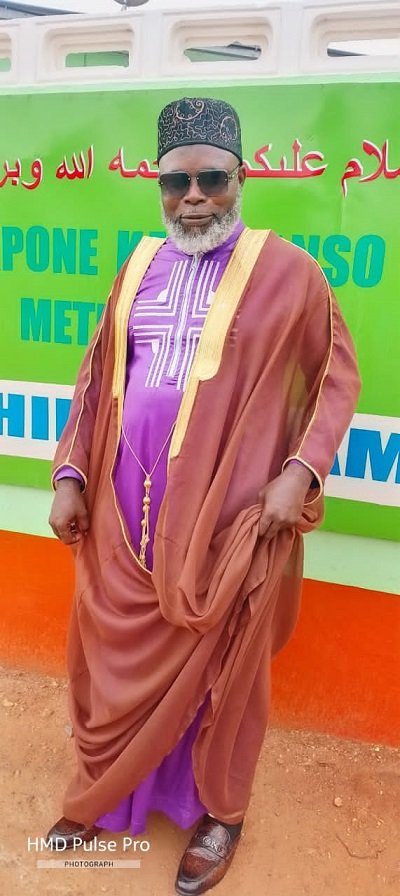Fruitful Living
The reason for the season

“For unto us a Child is born, unto us a Son is given: And the government will be upon His shoulder. And His name will be called Wonderful, Counsellor, Mighty God, Everlasting Father, Prince of Peace” – Isaiah 9:6 (NKJV).
INTRODUCTION
It is that time of the year again when we begin frantic preparations for Christmas. These days, the season is one big commercial venture and most supermarkets have already decorated for the season. I would, however, like us to spend time pondering on the real reason for the season. His Name is JESUS. He entered our world for a reason and so let us look at what He has done for us as we read in scripture and see how we can turn this Christmas into a time of worship, praise, thanksgiving, generosity and great joy.
1. HE CAME TO SAVE THE WORLD FROM SIN – “She will give birth to a Son, and you are to give Him the name JESUS, because He will save His people from their sins.” – Matthew 1:21
2. HE CAME TO RECONCILE US TO GOD – “That God was reconciling the world to Himself in Christ, not counting men’s sins against them. And He has committed to us the message of reconciliation.” – 2 Corinthians 5:19
3. HE CAME TO GIVE US:
(a) ABUNDANT LIFE – “The thief does not come except to steal, and to kill, and to destroy. I have come that they may have life, and that they may have it more abundantly.” – John 10:10
(b) GRACE
“The Word became flesh and made His dwelling among us. We have seen His glory, the glory of the One and Only, who came from the Father, full of grace and truth.” – John 1:14
“And are justified freely by His grace through the redemption that came by Christ Jesus.” – Romans 3:24
“For if, by the trespass of one man, death reigned through that one man, how much more will those who receive God’s abundant provision of grace….” – Romans 5:17a
“For it is by grace you have been saved, through faith, and this is not from yourselves it is the gift of God.” – Ephesians 2:8
“But the gift is not like the trespass. For if the many died by the trespass of the one man, how much more did God’s grace and the gift that came by the grace of the many” – Romans 5:15
(d) PEACE–
“Peace I leave with you; my peace I give you. I do not give you as the world gives. Do not let your hearts be troubled and do not be afraid” – John 14:27
“For He Himself is our peace, who has made the two one and has destroyed the barrier, the dividing wall of hostility, by abolishing in His fl esh the law with its commandments and regulations. His purpose was to create in Himself one new man out of the two, thus making peace, and in this one body to reconcile both of them to God through the cross, by which He put to death their hostility. He came and preached peace to you who were far away and peace to those who were near” – Ephesians 2:14-17
(e) A NEW LIFE –
“We are therefore buried with Him through baptism into death in order that, just as Christ was raised from the dead through the glory of the Father, we too may live a new life” – Romans 6:4
4. HE CAME THAT THROUGH HIS SACRIFICE WE WILL BE CHILDREN OF GOD –
“Yet to all who received Him, to those who believed in His name, He gave the right to become children of God” – John 1:12
• HE CAME TO MAKE US HOLY
“But you are a chosen people, a royal priesthood, a holy nation, a people belonging to God, that you may declare the praises of Him who called you out of darkness into His wonderful light” – 1 Peter 2:9
• HE CAME TO MAKE US RIGHTEOUS
“God made Him who had no sin to be sin for us, so that in Him we might become the righteousness of God” – 2 Corinthians 5:21
“… the gift of righteousness reign in life through the one man, Jesus Christ” – Rom. 5:17b
“However, to the man who does not work but trusts God who justifies the wicked, his faith is credited as righteousness” – Romans 4:5
• HE CAME THAT WE MIGHT BE AT PEACE WITH GOD –
“Therefore, since we have been justified through faith, we have peace with God through our Lord Jesus Christ” – Romans 5:1
• HE CAME THAT WE MIGHT BE FILLED WITH JOY –
“I have told you this so that my joy may be in you and that your joy may be Complete” – John 15:11
“For the kingdom of God is not a matter of eating and drinking, but of righteousness, peace and joy in the Holy Spirit – Romans 14:17
• HE CAME THAT WE MIGHT BE ENCAPSULATED WITH HIS LOVE –
“How great is the love the Father has lavished on us, that we should be called of God! And that is what we are! The reason the world does not know us is that it did not know Him” – 1 John 3:1
OUR RESPONSE?
We need to respond to God’s love and grace by accepting the gift God has given us through His Son Jesus Christ. In Christ, we find all the full ness of God. Let us meditate on John 1:12-13 and Revelation 3:20 and if we have not accepted God’s indescribable Gift, this is the time to do so.
ARE YOU READY FOR THE REAL CHRISTMAS?
As we celebrate another Christmas, let’s think about the spirit of the event, rather than allow ourselves to get trapped in just the celebrations. Some of those who saw Him walk on water still rejected Him. Some who witnessed His divine introduction as God’s beloved Son in whom He is well pleased – Matthew 3:17 – still despised Him. In the same way, many of us who have read about Him and witnessed His modern-day miracles still struggle to fully accept Him.
Angels heralded the birth of Jesus, because they knew the priceless sacrifice He had come to earth to perform. Humanity, the recipient of Jesus’ sacrifice was largely oblivious to His birth and uninterested in His mission. Even His death, the culmination of the reason for His birth, was the climax of humanity’s consternation with One they despised enough to get rid of. Yet, God the All-knowing, Alpha and Omega, who saw the full picture of how His Son would be treated, still chose to send Him to dwell among us.
If Jesus had not come, our situation would have been miserable, indeed. Glory filled the earth when He was born and angels adored Him. Wise men bowed before Him, with gifts of gratitude – gold, incense and myrrh. Throughout His life on earth, God the Father attended His prayers as dew moistened His brows during many early morning supplications for the redemption of man. At His death, all heaven stood still and darkness covered the face of the earth.
Jesus came and died and He is back in heaven at the right hand of God. Beyond the food, and drinks, and new clothes and gifts of this Christmas season, remember why He came. It was to die for our sins. Hence, the only reason that can recapture the essence of Christmas is to yearn for Christ Jesus to be born anew in the heart of men and women so that humanity will be born again in the image of Christ. Then heaven will blaze with glory and its hosts will rejoice over one more sinner, reconciled to God, the Father. It is the only reason for the season. Nothing else counts. Are we ready for the real Christmas?
Stay blessed!
For further inquiries please contact us on Tel Nos. 0243588467 / 0268130615
Email: saltnlightministries@gmail.com
Website: saltandlightministriesgh.org
By Dr Joyce Aryee, the author
Fruitful Living
Eid-ul-Adha: A living legacy of faith, sacrifice, and devotion

We begin in the name of Allah, the Most Merciful, the Most Compassionate. We praise Him, seek His help and forgiveness, and seek refuge in Him from the evils of our souls and the wrongs of our actions.
May peace and blessings be upon the Prophet Muhammad (peace be upon him), his family, his noble companions, and all those who follow his path until the Day of Judgment.
Understanding the essence
of Eid-ul-Adha
Eid-ul-Adha, the Festival of Sacrifice, is one of the two major Islamic celebrations observed by Muslims across the world.
It commemorates the unwavering submission of Prophet Ibrahim (Abraham, peace be upon him) to Allah’s command when he was prepared to sacrifice his beloved son Isma’il (Ishmael, peace be upon him). Allah, in His infinite mercy, intervened and replaced the son with a ram, thus honouring Ibrahim’s sincerity and faith.
This moment of sacrifice is recorded in the Qur’an: “Then when they had both submitted and he put him down upon his forehead, We called out: ‘O Ibrahim! You have fulfilled the vision.’ Indeed, We thus reward the doers of good.” (Surah As-Saffat, 37:103–105)
This act of obedience is not merely a historical account. It is a living symbol that forms the essence of Eid-ul-Adha.
Ibrahim (A.S): The Architect
of Submission
Before the moment of sacrifice, Prophet Ibrahim and his family played critical roles in establishing Islam’s foundational pillars:
1. The building of the Ka‘bah
Prophet Ibrahim and his son Isma’il were chosen to construct the Ka‘bah, the sacred House of Allah in Makkah. The Qur’an records this noble moment:
“And [mention] when Ibrahim was raising the foundations of the House and [with him] Isma’il, [saying], ‘Our Lord, accept [this] from us. Indeed, You are the Hearing, the Knowing.’”
(Surah Al-Baqarah 2:127)
This structure remains the spiritual centre of Muslim worship, facing which over a billion Muslims direct their daily prayers.
2. The struggle of Hajar (Hajara) between Safa and Marwa
The mother of Isma’il, Hajar (Hajara), exemplifies a profound lesson of patience and faith. Left in the barren valley of Makkah with her infant, she ran between the hills of Safa and Marwa, desperately searching for water. Her perseverance was rewarded when the well of Zamzam sprang forth at the feet of her baby.
Her sincere struggle is now ritualised in Hajj as the Sa‘i between Safa and Marwa—a reminder of the role of women, the power of du‘a, and the value of trust in Allah’s provision.
Sacrifice at Mina and the
Rites of Jamarat
During Hajj, pilgrims reenact Ibrahim’s confrontation with Shaytan at Mina, where he rejected the devil’s temptation and cast stones at him. This act is now observed in Hajj as the ritual of stoning the Jamarat, symbolising the rejection of evil, temptation, and disobedience.
It is a vivid spiritual lesson: the path to Allah is one of resistance to distraction and sin, and one must be prepared to fight these forces with unwavering faith.
The essence of Arafat in Hajj
The Prophet Muhammad said:“Hajj is Arafah.” (Sunan al-Tirmidhi, 889)
Standing on the plain of Arafat, in deep humility and supplication, is the heart of Hajj. It represents the Day of Judgment, when all of humanity will stand before their Creator. The Prophet said: “There is no day on which Allah frees more people from the Fire than the Day of Arafah.” (Sahih Muslim, 1348)
For pilgrims, Arafat is a time of repentance, reflection, and renewal— and for non-pilgrims, fasting on that day is highly recommended.
Three core lessons from the
Sacrifice of Prophet Ibrahim
(A.S.)
1. Absolute obedience to Allah
Ibrahim’s willingness to sacrifice his son teaches that the essence of faith is unquestioning obedience to Allah. He prioritised divine command over emotion, logic, or comfort.
Takeaway:
In our lives, we must also be ready to put aside our desires, egos, and even attachments if they conflict with Allah’s instructions. This may involve sacrifices such as waking up for Fajr, staying away from haram income, or being truthful in difficult situations.
2. Sincere intention and inner sacrifice
The real essence of the sacrifice lies in the heart’s submission to Allah.
It is neither their meat nor their blood that reaches Allah, but it is your piety that reaches Him.”
(Surah Al-Hajj 22:37)
Takeaway:
Every act of worship should be grounded in sincerity. Whether it is prayer, charity, or sacrifice, what matters most is the purity of our intention.
3. Sacrifice for the greater good
The legacy of Eid-ul-Adha teaches us that sometimes, faith requires us to give up what we love for a greater purpose. Sacrificing wealth, time, or status in the path of Allah or for the benefit of others leads to spiritual elevation.
Takeaway:
Use your resources such as time, money, skills, for acts of benefit: support the poor, educate the young, assist the sick, and build your community.
Celebrating Eid-ul-Adha: A
Festival for all Muslims
Even for those who do not go on Hajj, Eid-ul-Adha holds immense significance. Muslims across the world participate in the act of Qurbani (sacrifice) to honor the tradition of Ibrahim (A.S.).
Types of animals and their
symbolism
Permissible animals include goats, sheep, cows, and camels. Each must meet a minimum age and be free of defects. The sacrificed animal is then divided into three parts: one for the family, one for relatives and friends, and one for the poor and needy.
This distribution reflects the spirit of sharing, compassion, and social responsibility—values at the heart of Islam.
The eternal message of Eid-ul-Adha
Eid-ul-Adha is not merely a celebration; it is a living tradition that calls us to:
• Submit like Ibrahim,
• Strive like Hajar,
• Sacrifice like Isma’il,
• Reflect like the pilgrims at Arafat.
May this Eid awaken within us a renewed commitment to obedience, sincerity, and compassion.
Let us make every Eid-ul-Adha a step forward in our spiritual journey, embodying the values of submission, sacrifice, and service to humanity. I wish every Muslim Eid Mubaarak
By Imaam Alhaji Saeed Abdulai
(Kpone Katamanso Metropolitan Chief Imaam)
Fruitful Living
Steps taken by government to combat illicit drugs (Final part)
The Minister for the Interior, Muntaka Mohammed-Mubarak, has reaffirmed the government’s commitment to combating drug abuse and illicit trafficking for a safer environment which would
go a long way to make Ghana a drug-free country. 3News.com (2025)
Solutions to Illicit Drugs from the Islamic perspective
are comprehensive and emphasise of both prevention and treatment:
Tarbiyah (Islamic nurturing): Instilling strong Islamic values from childhood through Qur’anic education, regular prayer, and association with righteous companions.
Community preaching (Da’wah): Imams must consistently raise awareness during khutbahs and Islamic programs about the dangers of drugs and the beauty of a sober, productive life.
Faith-based rehabilitation: Mosques and Islamic centers can partner with medical institutions to offer Qur’an therapy, spiritual counseling, and structured recovery programs.
Islamic youth clubs: Providing youth with halal entertainment, mentorship, and purposeful engagement can steer them away from harmful peer groups.
Zakat and Sadaqah: Channelling funds to support families of victims and establishing centres for rehabilitation.
Role of Parents, Society, Muslim Chiefs and Imams:
Parents must be vigilant and provide emotional support. A loving, nurturing home reduces a child’s vulnerability to drugs.
Society should de-stigmatize addiction. Drug users should be seen as patients needing healing, not criminals deserving rejection.
Muslim Chiefs must lead community campaigns, setting moral examples and supporting policy enforcement.
Imams must be more than religious leaders—they must become counsellors, educators, and advocates. Their leadership can shift public perception and guide collective action.
Conclusion
Illicit drugs pose one of the most dangerous threats to our society, undermining our religious values, harming our youth, and destroying our future. The Islamic position is clear and
Unequivocal: such substances are forbidden due to their destructive consequences on all aspects of life. Islam does not merely condemn the act but calls for a holistic response—spiritual, social, and structural.
As a society, particularly as Muslims, we must rise to confront this crisis with faith, compassion, and commitment. We must not only preach against drugs but actively work to rehabilitate victims, educate the next generation, and partner with public institutions to create a society of wellness and righteousness.
Recommendations
1. Introduce Islamic drug awareness education in madrasas and public schools, using Quran and Hadith-based materials to instill moral responsibility.
2. Create partnerships between the Ghana Narcotics Control Commission, Ghana Health Service, and Muslim organisations to develop culturally sensitive rehabilitation centres.
3. Train Imams and teachers in basic mental health and drug abuse counselling to serve as front-line responders in communities.
4. Utilise Friday sermons (khutbahs) nationwide to address the dangers of drug abuse periodically and provide practical steps for prevention.
5. Encourage community surveillance, where parents, chiefs, and youth groups report dealers and suspicious activities to the authorities.
6. Establish mentorship programmes in every Muslim community where successful, drug-free role models mentor youth.
7. Form interfaith coalitions, working across religious lines to tackle the drug menace as a national threat rather than a religious issue.
8. Provide job skills training for rehabilitated victims, helping them reintegrate into society and live dignified, self-sufficient lives.
By Imam Alhaji Saeed Abdulai, the Author







